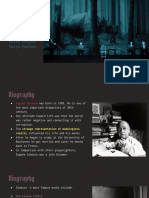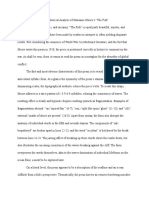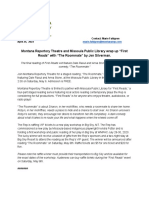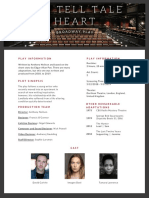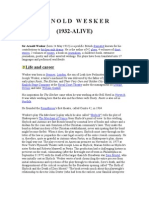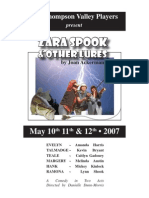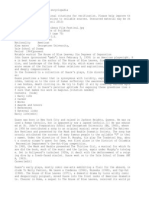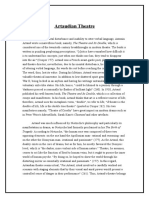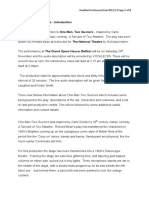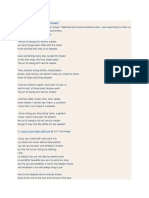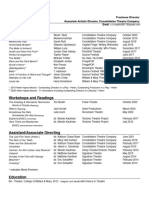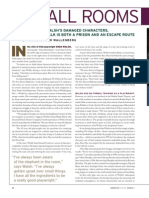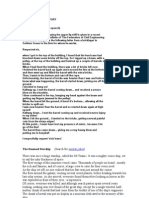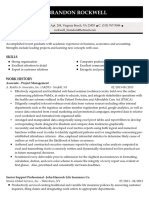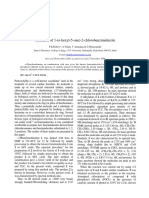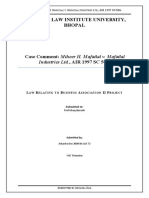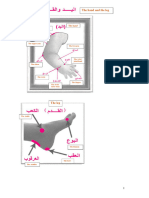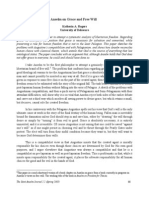Flea in Her Ear Program
Flea in Her Ear Program
Uploaded by
OranEldorCopyright:
Available Formats
Flea in Her Ear Program
Flea in Her Ear Program
Uploaded by
OranEldorOriginal Description:
Copyright
Available Formats
Share this document
Did you find this document useful?
Is this content inappropriate?
Copyright:
Available Formats
Flea in Her Ear Program
Flea in Her Ear Program
Uploaded by
OranEldorCopyright:
Available Formats
A Flea
in Her Ear
by
Georges Feydeau
Translation by John Mortimer
Teachers Resource Pack
Researched and written by
Amy Westgarth
A Flea in Her Ear Teaching Resources
A Flea in
Her Ear contents
A Flea in Her Ear at The Old Vic
Georges Feydeau: A Life and Career
Synopsis
Characters
Character Relationships Chart
Major Themes and Interests
Farce and its Origins
Introduction by Richard Eyre
A Note from John Mortimer
3
4
5
7
9
10
12
14
14
In Conversation with
Tom Hollander
Freddie Fox
John Marquez
15
17
19
Rehearsal Diary from the Assistant Director Psyche Stott
20
A Flea in Her Ear Teaching Resources
Georges Feydeau
life & Career
(Dates plays were written are shown in brackets)
1862
Born Georges Lon Jules Marie Feydeau on 8 December in
Paris.
1896
Le Dindon (An Absolute Turkey/Sauce for the Goose/
Paying the Piper) runs for 275 performances.
1869
Writes his first play.
1899
La dame de chez Maxim (The Lady from Maxims) runs for
524 performances allowing Feydeau to spend two years
painting.
1901
Feydeau, in financial difficulties, sells most of his art
collection.
1902
La duchesse des Folies-Bergre (The Duchess of the FoliesBergre) runs for 82 performances.
1904
La main passe (Shes All Yours/Winner Takes All) runs for
211 performances.
1906
Le Bourgeon (The Bud) runs for 92 performances.
1907
La puce loreille (A Flea in Her Ear) runs for 86
performances but closes after the death of one of the cast.
1908
Occupe-toi dAmlie (Keep an Eye on Amlie) runs for 288
performances.
1909
Feydeau leaves his wife and moves into the Htel Terminus
near Saint Lazare station.
1914
Je ne trompe pas mon mari (I Dont Cheat on my Husband)
runs for 200 performances.
1916
Feydeau divorced by his wife.
1919
Suffering from syphilis, Feydeau enters a sanatorium.
1921
He dies on 5 June.
187278 Attends the Lyce Saint-Louis.
187986 Performs plays and monologues in amateur concert parties
and theatre clubs. Writes his own monologues and one-act
comedies. During military service in 1884 he writes his first
full length play Tailleur pour dames. Works as an assistant
theatre manager and writes a newspaper column about the
stage.
On 17 December, Tailleur pour dames (A Gown for His
Mistress/Fitting for Ladies) begins a successful run of 79
performances at the Thtre de la Renaissance. During the
next 30 years Feydeau writes approximately 60 works for
the stage, including one-act plays, monologues, ballets,
comic operas, as well as over a dozen full-length plays.
1886
1888
Chat en poche (Pig in a Poke) is produced.
1889
Marries Marianne Carolus-Duran.
1892
Monsieur Chasse! (The Game Hunter/The Master
is Hunting!/The One That Got Away) runs for 114
performances. Champignol malgr lui (A Close Shave) runs
for 467 performances. Le Systme Ribadier (Where Theres
a Will) co-written with Maurice Hennequin runs for 78
performances.
Un fil la patte (Cat Among the Pigeons) runs for 129
performances. LHtel du libre change (Hotel Paradiso/
Hotel Casablanca/Hearts Desire Hotel/A Little Hotel on
the Side) co-written with Maurice Desvallires runs for 371
performances.
1894
Please note that this timeline contains selected Feydeau plays and their corresponding English translations.
A Flea in Her Ear Teaching Resources
A Flea in
Her ear SYNOPSIS
Act I
The play opens in the grand drawing room of the Chandebises household in Paris. Victor Emmanuel Chandebise and his
wife, Raymonde, are close friends with Don Carlos Homenides de Histangua and his wife, Lucienne. Dr Finache has carried
out a medical examination of Homenides, for insurance purposes. He has come to give the results to Chandebise who
happens to be out. Etienne, the butler, keeps Finache company while he waits and almost catches his wife, Antoinette,
kissing Camille Chandebise (Victor Emmanuels nephew). Camille baffles Lucienne with his speech impediment; the result of
a cleft palate.
Raymonde confides in her friend, Lucienne, that she thinks her husband has been having an affair at the seedy Hotel
Coq dOr. She had been considering starting one herself with her husbands friend, Romain Tournel, but is mortified that
Chandebise may have been having one already. The ladies concoct a plan to trap Chandebise. They write him a love letter
from an imaginary admirer asking him to meet her at The Hotel Coq dOr. They will be there waiting instead and if he
arrives they will have caught him in the act. Lucienne writes the letter in case Chandebise recognises his wife, Raymondes
handwriting.
In a private conversation, Dr Finache and Camille confess to each other that they are both regulars at The Hotel Coq dOr
and Finache presents Camille with a silver mouth palate that he can insert to make him speak properly.
The letter from the ladies arrives for Chandebise. Unbeknownst to the ladies, the gentlemen decide that it must be a case
of mistaken identity and cannot be for Chandebise but must be for the handsome Romain Tournel instead. The letter is very
effective; the men think the imaginary admirer is head-over-heels in love so the lusty Tournel agrees to go to the hotel to
meet her.
Don Carlos Homenides enters and Chandebise shows his friend the love letter. Homenides recognises his wifes handwriting
at once and is convinced that Lucienne wrote it to Chandebise, who denies this and explains that Tournel is meeting her
at The Hotel Coq dOr; Homenides vows to go there and kill him. Chandebise tells Camille that if he sees Tournel he is to
warn him that his life is at risk. Tournel returns to the house but cannot understand what Camille is trying to say. Camille
is desperate that Tournel should understand him so inserts the silver palate that Dr. Finache gave him before chasing after
Tournel.
Act II
The Hotel Coq dOr is run by ex-army colonel, Feraillon and his wife Olympe as a haven for those who want privacy for their
liaisons.
A room is visible with a bed beside a wall. Feraillon is proud of this camouflage system at the hotel; the wall revolves
revealing another bed which Feraillons old, rheumatic Uncle Baptistin, is employed to lie in - at the press of a button,
guests can revolve the wall so the beds switch. Feraillon also employs a hotel porter, Poche, an old army subordinate, who
was a destitute alcoholic and Eugenie, the maid. Dr Finache arrives; a regular on friendly terms with the staff. Another guest
we meet is Herr Schwarz, an amorous Prussian.
Raymonde arrives and is shown to her room where she waits to see if her husband has taken the bait but is shocked to see
Tournel enter. Tournel, convinced that Raymonde wrote to him and loves him, tries to seduce her. Mortified, Raymonde
confesses her scheme to reveal Chandebises indiscretions which Tournel denies. Raymonde contemplates an affair but
shrinks from Tournel, and presses the revolving wall button and Baptistin appears. Tournel searches for Raymonde and
they return to the room where Baptistin remains so they press the button to remove him, which reveals Poche instead.
Poche looks identical to Victor Emmanuel (Raymondes husband) which causes great upset to Raymonde and Tournel who
continually beg his forgiveness despite Poche, Baptistin and Feraillon explaining that he is Poche, the servant.
Camille and Antoinette appear and, also mistaking Poche for Chandebise, flee fearing discovery. Herr Schwarz emerges and
knocks Camilles palate out, restoring his speech impediment. Spotting Etienne (Antoinettes husband) arriving, Camille
flees. Etienne seeks Lucienne so he can warn her that her husband is intent on murder but accidentally goes to Herr
Schwarzs room where Antoinette is with Herr Schwartz. Etienne assumes she is having an affair and, in a fury, departs.
A Flea in Her Ear Teaching Resources
Before going, he sees Poche and mistakes him for his master, Chandebise. Poche thinks they are crazy calling him Sir and
Victor Emmanuel.
Lucienne arrives seeking Raymonde and sees Chandebise (who has also just arrived). He declares he knows she loves him
because her husband Homenides identified her handwriting on the letter. Realising the significance of her husband seeing
the letter Lucienne prepares to leave with Chandebise.
A murderous Homenides arrives to kill his wife and Tournel. Feraillon, seeing Chandebise and assuming that hes Poche,
orders him to remove his jacket and put on Poches uniform. Chandebise is bullied into doing so and exits. Poche then
returns seeking his uniform but in its absence dresses in Chandebises hat and jacket.
Raymonde and Tournel see Chandebise (as Poche) and ask him to call them a cab. Chandebise demands they explain their
presence together which confuses them as they think they have explained their innocence already (which they have but to
Poche). Feraillon appears and further abuses Chandebise believing him to be Poche. Lucienne and Camille enter trying to
flee Homenides; they become separated and Poche (who Lucienne thinks is Chandebise) rescues Lucienne. Chaos ensues as
everyone enters and chase around the hotel.
Act III
Tournel, Raymonde and Lucienne return from the hotel having been chased by Homenides brandishing his pistol. They
decide that Chandebises seemingly schizophrenic behaviour means he has gone mad.
Poche arrives at the house wanting to see Chandebise but everyone at the house think that he actually is Chandebise.
Etienne sends for Dr. Finache. Raymonde and Tournel persist in explaining to Poche that they are not having an affair,
believing him to be Chandebise. Raymonde goes to kiss him and smells alcohol on his breath. Finache arrives and they
conclude that Chandebise has become an alcoholic and is suffering hallucinations. They send Poche to bed to recover.
Chandebise - still dressed in Poches uniform, returns to the house. Camille sees Poche then immediately sees Chandebise
and believes that he is hallucinating too. Chandebise is furious to see Tournel at his house as he is still convinced that he is
having an affair with his wife. Finache tries to treat a bewildered Chandebise which infuriates him further.
Feraillon comes to the house and chases Chandebise, believing him to be Poche. Homenides arrives with two pistols and
challenges Chandebise to a dual. Chandebise flees in fear to his bedroom where he sees Poche asleep; recognising the
likeness to himself he is convinced that his house is haunted and runs away. Poche is woken by Homenides, who thinks he
has tracked Chandebise down and continues to challenge him to a dual. Poche escapes through an open window.
The others enter and Lucienne finally explains to Homenides that she wrote the letter to Chandebise as a favour to her
friend, Raymonde; he is placated by her explanation. After much confusion, all is made clear. Everybody realises that
the physical similarity between Poche and Chandebise has been the main cause of the madness. Raymonde explains to
Chandebise that she suspected he was having an affair which is why she sent the letter. Eventually, all is forgiven restoring
the status quo.
A Flea in Her Ear Teaching Resources
A Flea in
her Ear Characters
Victor Emmanuel Chandebise
Victor Emmanuel Chandebise is the director of The Boston Life Insurance Company in Paris. He is an upstanding citizen who
visits the theatre and is a faithful husband. He has married the extremely attractive Raymonde. His wife is everything to him.
Chandebise is a successful man, who works hard. He owns a large house and has the means to employ a household of staff.
Generous and loyal; he has kindly employed his nephew, Camille Chandebise, who suffers from a speech impediment and
also his friend Romain Tournel. He is innocent to the seedier side of Paris in the early 1900s, for example, he doesnt know
of the Hotel Coq dOr when it is first mentioned and wonders if it is one of those hotels? Aware that hes not the most
attractive man, he decides the letter he receives must be for his friend Tournel it wasnt me she fancied. It was you; thus
proving his modesty. By the end of the play he feels he that he has been on a joy-ride and is quite content for life to
return to normal.
Raymonde Chandebise
Raymonde is the wife of Victor Emmanuel Chandebise. She is young, attractive, imaginative and frivolous; her scheme
causes immense difficulty for all involved. Raymonde is extremely fickle; one moment she invites Tournel to have an affair
with her then she changes her mind once she decides that her husband is already having one Not now, thank you very
much. Not when hes unfaithful. She is self-centred and selfish yet is not intentionally malicious. She doesnt intend to
harm others but simply doesnt think about them having grown accustomed to getting her own way.
Don Carlos Homenides De Histangua
Testosterone fuelled, strong and manly. The Spanish aristocrat is married to Raymondes old friend Lucienne. Dr Finache
examines Homenides de Histangua and remarks upon his constitution, he is clearly a fine figure of a man. He possesses
a powerful presence and commands attention. Homenides is a demanding man with a fiery temper which bubbles to the
surface quickly and without much provocation. He proudly carries a pistol as a deterrent to his wife should he ever catch
her with another man. Full of murderous intent on seeing his wifes handwriting in the letter to Chandebise he terrorises
the visitors at the hotel I want to kill them! His fiery temper is easily abated however when his wife explains her part in the
scheme, it seems that he truly loves her.
Lucienne Homenides De Histangua
Lucienne is an old friend of Raymondes from their days at a convent school. Lucienne then married the Spaniard Don
Carlos Homenides De Histangua. She is seems a little sharper than Raymonde. She is witty and switched on, youve got
no proof she warns Raymonde when she is accusing Chandebise of having an affair. She is aware of her husbands temper
and is terrified when she realises he wants to kill her for writing the letter my husbands breathing down my neck. With a
revolver! She appears a little baffled by her husbands character What an impossible creature!
Romain Tournel
Tournel is a dashingly attractive man who women have committed suicide for. His best friend is Chandebise who also
employs him at The Boston Insurance Company in Paris. Tournel enjoys the existence of a bachelor; he sees many women
and admits to knowing the Hotel Coq dOr from previous experience. Not the most moral of men, he has few qualms about
embarking on an affair with Raymonde. He is arrogant and knows the effect he has on women. Tournel is totally selfobsessed Do you think I will be made a fool of, in front of myself!
Camille Chandebise
The young nephew of Victor Emmanuel Chandebise. Camille has a cleft palate and suffers from a speech impediment. He
has difficulty pronouncing consonants so his speech is almost impossible to understand. Chandebise has taken pity on him
and employed him as his secretary so that he has an occupation. He leads a double life, at home he is seen as innocent
and sweet the virginal young Camille but he and Dr Finache compare notes on The Hotel Coq dOr where they are both
regulars. Camille has been having an affair with the cook, Antoinette.
A Flea in Her Ear Teaching Resources
Dr Finache
Dr Finache is Chief Medical Officer of The Boston Life
Insurance Company in Paris. He carries out insurance
medicals for the company. He regularly frequents the The
Hotel Coq dOr its where I go for my little adventures; he
enjoys the ladies and admits to Camille that he would never
go anywhere else. A respectable doctor by day he ventures
into the darker realms of the city at night- the staff at the
hotel know him well.
Etienne Plucheaux
Etienne is the butler at the Chandebises house. He likes
the sound of his own voice and is rather self-important. He
tends to irritate the guests and is not very polite Madame
whatever your name is. He is frequently out-witted by his
wife, the cook, Antoinette.
Antoinette Plucheaux
Wife of Etienne, she is the cook at the Chandebises house. She has been having an affair with Camille Chandebise but is a
calculating woman who tells lies, backed up with alibis, which mean her husband never quite captures her in the act.
Augustin Feraillon
The militant hotelier of The Hotel Coq dOr. He was once a colonel in the army and likes to run the hotel with discipline.
Augustin ironically values respectability and the hotels reputation, although he practically runs a brothel. He likes to
treat all the guests with the utmost discretion. He is married to Olympe Feraillon who also works at the hotel.
Olympe Feraillon
The wife of Augustin Feraillon, she runs also runs The Hotel Coq dOr. She has a colourful past. Before marrying Augustin,
Olympe was known as The Copper-Bottomed Contessa, she was the mistress of a duke and appeared naked at a
freemasons dinner. She became famous for this event. Now she is the gracious hostess of the hotel.
Poche
The hotel porter at The Hotel Coq dOr. Once served under Feraillon in the army but was discharged for drunkenness.
Feraillon gave him a job at the hotel because he finds him easy to control he beats him and makes him work in return for
his keep. He is uneducated, working class and a simple soul. He fears Feraillon who beats him. He likes routine but drinks
whenever he has the chance. Poche bears an uncanny resemblance to Victor Emmanuel Chandebise.
Baptistin
An old, rheumatic uncle of Augustin Feraillon. Feraillon employs him to act as a decoy at the hotel, should a suspecting
spouse arrive to search for their unfaithful husband or wife.
Eugenie
Chambermaid at The Hotel Coq dOr. A simple girl who follows orders.
Herr Schwarz
A sex-crazed Prussian gentleman nicknamed Herr Shutyourhole by Poche. He is a regular at The Hotel Coq dOr. Nobody
understands him as he speaks only German but he insists on talking anyway. He appears to be always waiting, hoping that a
lady will come to visit him but they never do. Desperate for female company he accosts any woman he can get his hands on.
A FLEA IN HER EAR
MAIN CHARACTER RELATIONSHIPS
Chandebise Residence
Hotel Coq dOr
Dr
Finache
Baptistin
PHYSICIAN TO
EMMANUEL
UNCLE
MARRIED
Lucienne
MARRIED
Raymonde
Don Carlos
Homenides
BELIEVES
LUCIENNE HAS
AN AFFAIR
WITH ROMAIN
MARRIED
Victor
Emmanuel
Chandebise
Antoinette
Etienne
MARRIED
Augustin
Feraillon
Olympe
UNCLE
Romain
Tournel
Camille
IN FACT
DESIRES
RAYMONDE
IS HAVING AN
AFFAIR WITH
ANTOINETTE
GUEST OF HOTEL
Herr
Schwarz
AUGUSTIN
OWNS THE
HOTEL
HOTEL EMPLOYEES
Poche
Eugenie
A Flea in Her Ear Teaching Resources
A Flea in Her Ear Major
themes & interests
Appearances
Appearances can be deceiving. Typical of a farce, one of the main causes of the action is a case of mistaken identity. Much
of the confusion that occurs could be avoided if only the characters would realise that they have confused Chandebise
and Poche. This serves a comic purpose but Feydeau is also making a more profound comment on civilisation. In the 19th
Century what you wore spoke volumes about who you were, how much money you had, what class of society you came
from and how much value you therefore deserved. Less overtly obvious today, we do still however judge people on their
appearance. The characters in the play rely so heavily on appearances that Raymonde does not realise she is talking to the
hotel porter, not her own husband, simply because they look the same. Feydeau seems to be commenting on how easily
persuaded we are by appearances, so much so that a servant can become a gentleman merely by changing his jacket.
Marriage
In the 19th Century marriage was still respected as a crucial institution, the only way a man and woman could lead
an honest, pious life together. Children produced outside marriage were still branded bastards; marriage was the only
respectable way to procreate and live with a member of the opposite sex. Feydeau was unusual because he didnt depict
marriage as an infallible union; all the marriages in the play have faults. Feraillon, defending the reputation of his hotel by
saying only married couples come here confirms the link between marriage and respectability. Lack of communication is a
distinct problem within the marriages of the play, as Dr Finache advises Chandebise once he has described his impotence
You should have told your wife all you told meshed have had a good laugh, and youd have enjoyed the joke together.
Feydeau was an observer of the liberal, fun loving culture of Paris in the 19th Century. He witnessed the hedonistic
behaviour going on around him, to present it on stage to the very people on whom it was based was both daring and
shocking and all the more funny because it was so close to the truth.
Infidelity and Sex
The play opens with Antoinette trying to kiss Camille. Etienne is then seen explaining to Dr Finache that Antoinette
has got some strange idea about me and the housemaid; immediately infidelity is established as a major theme in the
play. Raymonde believes Victor Emmanuel is unfaithful whilst also confessing that she has even thought about taking a
lover. Tournel does not seem to mind that Raymonde is married to his friend and employer and pursues her regardless.
The Hotel Coq dOrs main purpose is to provide a place of tact and discretion for those who are unfaithful. Throughout
the play characters are themselves committing adultery, thinking their partner is committing adultery or being accused of
committing it.
Sex is alluded to frequently in the text. Feydeau uses innuendo to insinuate sexual references and even acknowledges that
he is doing it through Feraillon saying Im not making any innuendoes. Dr Finache alludes to Homenides sexual prowess
What a constitution! What stamina! and the whole description of Chandebises impotence is realised through metaphor
and innuendo. Feydeau makes it overtly clear that he is making these risqu sexual references but the innuendoes serve the
comic purpose far better than saying them outright.
Self-obsession/ Narcissism
If only the characters were less concerned with their own circumstances, they would be far better equipped to find out
what is actually going on. Raymonde and Tournel particularly are both utterly self-obsessed; Raymonde has such double
standards that even when talking about Chandebise having an affair she admits that she may want to deceive him but
for him to deceive me! No! Its going too far! Raymondes hypocrisy is borne of her sense of self-importance. Tournel is
embarrassed of being made a fool of in front of [him]self! They are both so intent on talking themselves out of trouble
with Chandebise that they entirely dominate their first encounter with Poche and barely ask him any questions; they just
keep talking and therefore dont notice that he simply resembles Chandebise. Homenides is similarly narcissistic; once he
decides that Lucienne is having an affair, he charges around hell-bent on destruction, brandishing his weapons. He doesnt
stop to question the situation but simply wants vengeance. They are all blind to any simple resolution because they are too
self-absorbed. It isnt difficult to imagine these characters existing in the Paris that Feydeau inhabited which valued fun,
pleasure and liberation of the self.
10
A Flea in Her Ear Teaching Resources
Timing
Timing is crucial to the success of this play. Feydeau knew this which is why the play is accompanied by detailed stage
directions. The many entrances and exits are all vitally important and specifically placed. They punctuate the rhythm of
the play and help to translate the quick energy of the action and the sense of confusion. There is so much going on all
at once that the audience feel the same sense of bewilderment as the characters. Much of the plot hinges on people just
missing each other, prolonging the anticipation of a resolution. In Act I Chandebise just misses Tournel; the audience see
Chandebise leave to warn Tournel that Homenides wants to kill him, and once hes left, immediately Tournel enters again. To
make matters worse, Camille doesnt remember his metal mouth roof until Tournel has already left once more so is unable to
speak clearly enough to warn him of the danger.
Class
The play mocks the world of the chattering classes. Even the name of Don Carlos Homenides de Histangua is so over the
top that it seems ridiculous; Etienne mocks it by saying whatever your name is. The play suggests that morals in these
circles are loose and that infidelity is rife. It sends up men like Tournel as good looking, a bit stupid and spending all
their time chasing ladies. It makes the ladies, Lucienne and Raymonde, appear selfish and silly. Men like Chandebise come
across as nave. When the action moves to The Hotel Coq dOr, the alleged working class are better behaved; Feraillon
and Olympe being happily married and faithful. Through the confusion with Chandebise and Poche it seems Feydeau is
commenting that, for all their airs and etiquette, all that really separates the upper and the lower classes is their clothes.
11
A Flea in Her Ear Teaching Resources
A Flea in Her
Ear Farce & its Origins
What is farce?
Farce is a style of comedy that has its roots as far back as Greek and Roman Theatre.
It had its real heyday in the 19th and early 20th Century, however, particularly in
France. A comedy can be defined as a farce by the following characteristics:
An improbable, unlikely plot featuring extreme and heightened situations.
Characters in disguise and cases of mistaken identity.
Respectable, dignified characters. This makes it much funnier when
undignified things happen to them.
Word play; flirtatious language, sexual innuendo, double entendres (double
meanings).
Physical, stylized performances of exaggerated characters; stereotypes of
their class and sex.
The lives of the characters are less important than the plot. These stylized
performances mean that the characters are more representative of a type of
person than an individual. This generalisation makes the characters better
able to reflect large groups of society.
A plot consisting of sexual misadventure, deception, characters deflecting
blame, comic despair and a sense that everything is about to go very badly
wrong. Spontaneous action that builds to a final crescendo, often ending in
a chase scene.
When? Historical Context
The period from 18901914 is now known as La Belle poque. It was a time of
relative peace and stability in Western Europe. The so called second industrial
revolution included advances in technology that affected the everyday lives of people all over the advanced countries of
Western Europe. Railways began to connect many of the major cities of these rapidly changing countries. Electricity was
better understood meaning that people could have basic electric heating and light in their homes instead of only gas.
Communicating became easier with the invention of telephones, telegrams and typewriters.
Paris flourished as the artistic capital of the western world. The fashion industry started to behave more as it does today,
designers began changing their collections with the seasons. Cafs and restaurants sprang up all over the city. Artists,
musicians, writers and performers were all drawn to this exciting and thriving melting pot of creativity.
In previous times, theatre-going and enjoyment of the arts had been geared towards the upper classes but now the middle
classes particularly started to enjoy these activities as well. People who worked hard started to play hard too. Half a million
Parisians attended the theatre at least once a week states Felicia Hardison Londr in her book Words at Play.
The middle classes in France were now making more money; they owned factories and could pay the working classes very
little money thereby making themselves an awful lot. This was a capitalist society where the old systems of hereditary
titles and aristocracy became less important than obvious displays of wealth. These people liked to be seen at the most
fashionable places, displaying their luxurious clothes and presenting an image of a perfect life and they came to be
described as the bourgeoisie.
With so much fun to be had the bourgeoisie were not immune to the darker sides of life too. Morals slipped somewhat
and infidelities were rife. Feydeau reflects this in his farces of the time. He had a regular table booked at the exclusive and
fashionable restaurant, Maxims, where he observed the antics of the other guests for later use in his writing. Something
that Feydeau frequently explores in his plays is marriage and infidelity.
France was more liberal than England at this time. From 1737 until 1968 all plays intended for the British stage were subject
to The Lord Chamberlains censorship. All productions had to receive a license for public performance dependent upon
the content and morality of the piece. Feydeau was too raunchy for the British stage so when A Flea in Her Ear was first
brought to England in 1917 the translators had to make extensive changes to the script to make it seem more innocent.
12
A Flea in Her Ear Teaching Resources
Who? Main contributors
The most well-known French writers of farce are Labiche (18621921) and Feydeau (18621921). Labiches plays reflected
the daily life of the French bourgeoisie in their pursuit of pleasure, money and marriage. Feydeaus plays took a more
cynical view of the bourgeoisie, they are more critical of society, raunchier and openly suggestive about the sex lives of
the well to do. Labiche is heralded mainly for the volume of plays that he wrote an estimated 174 while Feydeau is
credited for his ability to visualise the physical action on stage and his skill at almost conducting the audiences laughter
with the precision of an engineer.
What is the relevance of farce today?
Thus far Farce in theatre has been less prevalent in the 21st century. The difficulty in writing a farce for the contemporary
stage may lie in the fact that society has far fewer taboos today than it did in the 19th Century. One of the main functions
of farce was to overturn, and therefore question, widely accepted values and for that reason it flourished in a community
supposedly dominated by moral code and conduct. The questioning of class and morality which was so shocking then is far
less relevant today when class boundaries are much more loosely defined and institutions like marriage less widely adhered
to or necessary.
One of the last, most successful farces written was Noises Off by Michael Frayn in 1982 but since then it is not a genre
often attempted by modern playwrights. That said, elements appear in many television comedies and that is perhaps the
genre that has absorbed farce most welcomingly. The relationship between farce and the camera can be seen as early as the
1920s, with Charlie Chaplin using elements, but continues through to Fawlty Towers in the 1970s, Blackadder in the 1980s
right up to today with comedies like Friends, Curb Your Enthusiasm and Peep Show.
13
A Flea in Her Ear Teaching Resources
Introduction by
Richard Eyre
I was lucky to be a friend of John Mortimer and if I have a regret about doing his version of A Flea in Her Ear, its only that
John cant be here to see it. He died in January 2009. I was asked by his family to give the address at his funeral. This is
part of what I said:
You could say John was larger than life; you could also say that life was smaller than John. His legacy will be some hugely
entertaining plays and novels, some dazzling epigrams and, in Rumpole, a character who can stand beside those of
Shakespeare and Dickens. Above all, though, what will survive of John will be the affection of hundreds who are grateful
for having had the luck to spend time with a man who was touched by greatness who was humane, generous, liberal,
loving, charming, funny, flirtatious, seductive, sexy, raffish, kind, sometimes bashful, never boastful, often vulnerable and
full of self-doubt, fastidious, proud, just, indignant on behalf of victims and passionate on the part of the dispossessed,
extravagant, wise, decent, tolerant and unique. He multiplied the gaiety of nations.
A Note from
John Mortimer
The world of farce is necessarily square, solid, respectable and totally sure of itself: only so can it be exploded. There
is nothing comical about a trembling masochist being kicked on the behind, or a sprightly and permissive collection of
Swedish teenagers being caught in the wrong bedrooms. These events must occur only to the most dignified and moral
persons. It is impossible to be funny about funny people. Feydeaus characters are triumphantly serious.
They are also mature, and almost completely satisfied. They have settled, on the whole gratefully, for security, marriage
with the Director of the Insurance Company, a few nights out at the theatre, and a few safely uncompromising glances at
the husbands best friend. Its all sound, predictable, and a little dull. The husbands are not quite in their first youth, in bed
they have become indolent or worse. Their healthy, grown-up, but still somehow schoolgirlish wives breathe virtue as
Feydeau said and are forthwith out of breath. They very much regret that its hard to take a lover without deceiving your
husband. And the husbands still envy their bachelor friends (for whom, it appears, ladies rapturously poison themselves)
and still cast a wary but interested eye towards the sleazy hotels they pass on their way home from the office. Feydeaus
plays, like all great drama, start at the moment when these small longings become alarming reality.
For then, of course, the world of common sense whirls and dips like a drunkards bedroom. The first small domestic
misunderstanding, the gentlest of white lies, brings down a series of disasters as inevitable and appalling as a speededup Greek tragedy. By then the husbands and wives and mistresses and lovers have become so inextricably confused that
its hard to tell if youre being faithful or not, and theres no time to jump into the vaguely longed-for bed as everyones
running far too fast.
Through all this, the characters must retain their common sense, like a hat desperately held on in a high wind. Kicked,
unexpectedly embraced, shot at, taken for mad, they continue to behave quite rationally conduct which of course greatly
increases the lunacy of the entire situation.
Feydeau wrote thirty-nine plays, apparently out of extreme indolence. When he was a child his father found him writing
and told his governess that he need do no lessons as hed written a play that morning. From then on Feydeau wrote to
avoid sums. He was so lazy that when a friend said to him: Turn round. The prettiest woman Ive ever seen has just come
into the room, he answered, without moving: Describe her to me. He sat in a caf in the Rue Vivienne and made wild and
ill-calculated investments on the Stock Exchange. Thus he had the great traditional stimulants to the industry of an artist:
laziness and debt. A friend described him as elegant, gentle and charming, a poet who knew the wealth of fantasy, as well
as disenchantment, that hovers in the smoke rings of a cigar. Its hard not to see in Feydeau one of his own characters,
sensible and detached, choosing a quiet life; but unceremoniously booted into a world of frenetic creation that became, at
the drop of a coincidence, gloriously out of control.
This note first appeared in the National Theatres programme for A Flea in Her Ear in 1966.
14
A Flea in Her Ear Teaching Resources
In Conversation
with Tom Hollander
At the time of this interview Tom had injured his
arm and was unable to perform.
Did you know much about farce as a genre
before you started to work on the play?
No, except everybody said how seriously you
had to take it- Id heard that many times,
without realising quite what that meant
physically. I always thought that it was about
taking the characters seriously but it also turns
out that you have to take it very seriously from
an athletic point of view.
Watching you run around on stage is quite
something, you must be exhausted and
much fitter than you were before you
started.
I was until this accident, yes. Now Im
concerned that my fitness is dropping while Im
convalescing so its going to be a bit of a shock
when I hit the stage again.
The two parts you play are physically very
different. Did you go through any specific
processes to accentuate these differences?
Well, they became physically different just by
thinking of them as two different characters.
So Im thinking of one as them as a bit uptight
while the other one is more relaxed, one is educated and one is not educated, one is impotent, the other is priapic (relating
to male sexuality & sexual activity), one is a bit slovenly and the other a bit of a poseur so I just went through opposites
like that and physically that had a natural consequence. Chandebise is a bit anal and uptight while Poche is more relaxed
and a drunkard of course! Theres the whole section in Act 3 where hes drunk so that clearly has implications for ones
physicality. Whats also interesting, beyond making the differences clear, is the similarities. So the miracle is that they are
almost genetically the same, nearly twins, but have gone down totally different paths but then in what respect are they
similar physically? The fact that theyre similar is also part of the pleasure of it. Once the audience believes that theyre two
different people they then enjoy how similar they actually are to each other. If only they knew each otherthe audience
even start to think that they might meet and you sort of want Feydeau to be able to pull that off, he cant obviously but
the closest he can get to it is having Chandebise rush into the bedroom and come out of it again saying Ive just seen
myself lying on my bed and that gets a roar of laughter. At the end he says Poche, Poche, nothing but Poche! Im sorry he
left in such a hurry, Id like to have seen him close to, my second self and that sort of releases something in the audience as
well- a feeling of relief that Ive said that, that line is there for them really.
As you have so many entrances and exits, have you had any moments where youve come on as the wrong
character or not known where youre meant to be?
Not as such. This is very, very fast. In most plays you have time to think about whats going to happen next, in this you
dont have so much time so generally I find when I come off stage I sort of walk off into the blackness, a bit like stepping
off a ledge into an infinite space of nothingness. Im mostly thinking about whats just happened so I often dont know
what the next entrance is and I have to try very hard to keep myself moving as I know Im going to have to come on again
and need to prepare myself. Now were used to it I know whats going to happen but it took me ages. In rehearsal, previews
and the first production week I regularly came off and just blanked, I had no idea what was happening next but now the
dressers effectively point me in the right direction!
15
A Flea in Her Ear Teaching Resources
When you first saw the script did it worry you how quickly you would have to go from one character to the
other?
It wasnt that clear on the page, it was only once we started doing it that it became clear how quick it was and then when
you run it you realise how exhausting it is.
The timing and the pace are so crucial to making the play funny, how did you work on that in rehearsal? Was it
frustrating having to go over things hundreds of times to get them just right?
To be honest, its evolving all the time so we got some things right and we didnt get other things right and some things are
probably better now. Rehearsals were really about defining a style and a pace.
I probably took up twice as much of the directors time than anyone else because I was playing two parts but obviously, for
the central device of the show to work; those two parts had to be clearly delineated.
Feydeaus farcical characters are well known for having a little more depth than other farcical characters. Have
you found that to be true?
They are terribly well conceived archetypal characters so its just a question of identifying what sort of archetype hes
allowing you to play and playing it in your own way. Those characters are pretty efficiently drawn, theres clearly no poetry
there and theres not much reflective stuff but, that said, there are moments. Feraillon gets to be wistful about his military
past, Etienne and Antoinettes relationship is quite deeply defined as a married couple. John Marquezs performance is
brilliant and his Homenides is a completely rounded character, you know who he is. Theres pride and vulnerability there. Its
not just two dimensional farce. If they were in a different play, on a normal day in their lives, not one where they all went
mad and got a flea in their ear, they could probably end up in a Chekov play- if they were slowed down and made to be a
bit more reflective! Its the same sort of period.
I read somewhere that you were in a play with Nick Clegg at university, have you any plans to collaborate with
him on further acting projects in the future?
No! He is, however ,coming to see the show!
16
A Flea in Her Ear Teaching Resources
In Conversation
with Freddie Fox
Its not been a bad year for you considering you only just graduated; youve done lots of exciting things
already. Was it at all intimidating for you when you started rehearsals?
I knew that Richard had wanted to do the play for years and years and had it in the pipeline so I had always thought that it
would be wonderful to be part of but Id never dreamed it would be my first theatre job, I thought it might be something I
could do further down the line. So when I got it I thought Woah! I read the script and just thought this is so funny. My
agent described it as gold plated theatre Tom Hollander, Richard Eyre, John Mortimer. John was my godfather and did
the best ever translation plus I get to play a guy with a cleft palate!
Its quite challenging though for a first big role, its not the easy option!
It was a bit daunting. I thought how am I going to make this funny? I also knew that Edward Hardwicke, when he did it in
1966, had been hysterically funny and I heard that hed been offered about two TV series and a comedy show off the back
of it so it was a bit intimidating but then when youve got Richard there being so calm and directing you all that goes out of
the window.
I suppose hes helped and youre helped by Feydeaus stage directions? Theyre all so carefully crafted that a
director has to listen to them really doesnt he?
Yes I think so. I mean Feydeau has written it like a mathematical puzzle, like a calculus paper and the formulas have to be
obeyed or the comedy doesnt work.
In rehearsal did you have to go over things again and again to perfect the timing? It must have become slightly
laborious?
Well yes but then you can go over things again and again in rehearsals but when you get on stage things change. In the
second show we did I whacked Tom (Hollander) with a door, blood spurted all over the stage! It was a combination of
me opening the door very quickly and the fact that we hadnt rehearsed a new move and as soon as you dont rehearse
something in a play of this pace things go wrong, so that attention to detail is necessary.
17
Design for Living Teaching Resources
Where did you start with the speech impediment caused by the cleft palate? Did you go and listen to people
speak who had cleft palates? Did you have a vocal coach?
It started with me speaking to a few people, one of whom was a teacher of mine at Guildhall. He had played Camille himself
a long time ago so I asked him if he could remember how the cleft palate affected his speech. His interpretation wasnt one
that I thought was very medically accurate. You could get away with overblown mistruths back when he did it but nowadays
it would have to be a lot more politically and factually correct.
I ... phoned a doctor contact of mine who put me in touch with a wonderful woman at Great Ormond Street Hospital called
Debbie Sell. She specialises in cleft palate surgery. I said that I didnt want to be taking the mickey out of Camille, hes just
a guy with a speech impediment and while that makes it very funny in the context of the play, he wouldnt find it funny; its
just the way he speaks. They showed me some amazing material of young people going through speech therapy before an
operation on their cleft palate. So thats how I started, I listened to a lot of kids in that situation and then I just practised
and practised.
What is so remarkable is that you still make yourself understandable.
There are moments when other characters repeat my lines so obviously the audience pick those up but then you do still
have to be intelligible; people have to understand why youre not being understood. So I start the show making the
impediment more realistic and profound and then once that impression is created I ease it slightly to make it a bit more
understandable.
Camille leads a bit of a double existence, how did you deal with the two sides of his character?
I was really confused when I got the script at first. I was thinking how is this guy virginal yet naughty? What is he meant
to be more of? I then made the decision that he was very sexual, almost more sexually charged than anyone else in the
play but that he has to hide it away from everyone, introduces a new dimension to his character.
It must be quite poignant for you that John Mortimer was your godfather and now youre doing this play, he
presumably would have been very proud of you.
Yes, I feel like there must be a bit of fate involved there. I think perhaps its meant to be.
18
A Flea in Her Ear Teaching Resources
In Conversation
with John Marquez
You speak Spanish in the play and your name is Marquez, are you Spanish?
No, well my dad is Spanish but I dont actually speak Spanish. My mum was English so all five of us kids just spoke English
but we obviously heard Spanish a lot so thats why I can do the accent. When I found out I had this part I also wanted to
portray the high range that my Dad uses when he speaks, even when he speaks English, unfortunately it sounds very funny
in English and we all used to laugh at him when we were kids! So I got the humour from there really.
So because your dad is Spanish, did he have any influence on how you portrayed Homenides?
Yeah, massively. Not necessarily physically but vocally. Also the whole thing of getting extremely emotional and dramatic
over tiny things Ive taken from my dad because he would get very upset very easily.
Physically, your interpretation occasionally made me think of Tango and Flamenco; have you had any dance
training, did you use dance as an influence?
No, not really. I mean I had a bit of dance training at Drama College but Ive always been quite physical and able to move
well. Ive messed around with Flamenco in a comedy way before. The heels and the costume for this part give you that
attitude anyway. Homenides is an aristocrat too which helps to give him that confident posture.
Did you find the detailed stage directions a hindrance at any stage? They are very specific; did you ever feel
trapped by them?
At times I might have thought that I wanted to try something from a different position but then Richard Eyre was always
very good. Id either say something or Id just try it and if he didnt say anything against it then Id just keep doing it.
Whats it like working with him?
Its been fantastic. To be honest, Id never met him before and I was very scared just of the name but its kind of like being
directed by your favourite uncle. Hes a really lovely man, he gives you a lot of confidence to develop what you want to
develop but he will direct you when he needs to. Hes very gentle but very, very astute.
Is this also your first time at The Old Vic?
It is, yes and I love it.
19
A Flea in Her Ear Teaching Resources
Its Raining in Rehearsals
Assistant Director Psyche Stott dips into her rehearsal diary to
reveal some of the surprises that arise when a company tackles
Feydeau.
Our Assistant Stage Manager Oli rushes for a bucket. Jen the Deputy Stage
Manager grabs some tissues. Richard Eyre, meanwhile, continues to discuss with
Oliver Cotton, who plays Dr Finache, the details of his state of undress. Shoes
on or off? as he is pulled down the stairs by the maid Eugnie to attend to
Olympe, a character experiencing the screaming tifftaffs. During this action, the
rehearsal photographer takes the opportunity to step in for some close-ups. The
wet floor is a potential hazard because one of the puddles is forming on the spot
where the actors enter the scene.
This chance moment in rehearsals mirrors exactly, for a couple of minutes, the
tempo of the play; many things happening to many people all at once with the
underlying potential of a mini-disaster connecting everyone. In Feydeaus play,
every single element has been considered and crafted, nothing is left to chance; it
is masterfully structured.
Following the first read through at the beginning of the week, Richard explains to
the company that this will be a difficult play to rehearse because it goes at such a
pace. But before we can do this in earnest, we have to slow it down and work out
each moment. As we start to explore the action and the thoughts behind each
line, reaction-by-reaction, we discover hes right!
Plotting the precise timing of the action starts to make some moments feel untruthful for the actors so we read the scene
without the movement to remind them of the tempo they are aiming for. Some reactions only make sense when the scene is
played at speed. The scene is then run again and the problems disappear.
Richard observes: Its a painful paradox that it happens quickly but you have
to rehearse it slowly to begin with. Its not unlike the musical score of a great
composer. Every pause, inflection and the tempo is intricate.
The cast explores a particular moment: Is our reaction a result of what Feraillon is
doing to Chandebise or a result of what he is saying? Are we disgusted? Richard:
No, horrified.
We try this moment again and the musicality of the text is transformed from
a descending series of Ahs to ascending Ahs, as if going up a musical scale,
increasing the intensity along the way. By doing so, it instantly becomes more
truthful and funnier.
A few days later, we are in the middle of rehearsing a scene where Chandebise
(played by Tom Hollander) receives an anonymous love letter to the great
disbelief of Dr Finache and Tournel (played by Jonathan Cake).
Tournel: You!
Finache: You, Chandebise!
Chandebise: Me! Chandebise! She couldnt take her eyes off me
Tournel: (taking the letter and moving RC) You were in a box with your wife and another man
Chandebise: Another man. Thats you, Tournel.
(Taking the letter) Another man X.
The audience at this point are one step ahead of the characters. They have witnessed the writing of the letter in an earlier
scene, so they know who it is from, what it says, and that it is drenched in perfume. We are working from page 19 of the
script and discover the following on the next page:
20
A Flea in Her Ear Teaching Resources
Tournel: Oh, my dear fellows
Chandebise and Finache (together): What?
Tournel: What does she mix her tears with to make them smell so overpowering?
Actor Jonathan Cake asks why he, as Tournel, hasnt smelt the perfume before? Its a good question and we pause to find
an answer. The stage directions clearly say Tournel takes the letter from Chandebise, so why doesnt he smell it?
We try a couple of versions of the scene exploring what happens if Tournel doesnt take the letter but looks at it over the
shoulder of Chandebise. This doesnt really work.
Is the letter a magnet for attention?
We try once more, this time with all three characters reacting as if gobsmacked by the letter. Richard then suggests that
perhaps Tournel and Finache dont actually take it too seriously until the mention of The Hotel Coq dOr, an establishment
they are both familiar with. This makes sense of their relationship with Chandebise and of the stage direction where Tournel
takes the letter. But we are still confused as to why Tournel doesnt smell the perfume straight away.
Richard looks to Feydeaus original text for clues. We discover Feydeau has in fact written a stage direction explaining that
Tournel leans on the table and Chandebise wafts the letter under his nose at this very moment. Et voil!
This is not the first time Feydeau has helped us make sense of the action.
To follow or not to follow the stage directions.
In Act III Tom Hollander, who plays the characters of Chandebise and Poche, has only three lines (25 seconds at the
last count) to exit down stage left as Poche, change costume and re-appear up stage centre as Chandebise. How is this
humanly possible?
What if the trousers are neutral and it is just the top that is changed?
Richard: It needs to be a complete change of costume for it to be convincing.
There dont seem to be any indications in the stage directions of John Mortimers translation, so Richard refers back to
Feydeaus French text again. He discovers a detailed and infinite breakdown of exactly how this can be achieved, right
down to where the dresser should be waiting. Its quite brilliant but I shant spoil the surprise.
Richard explains that when typically rehearsing a play, it isnt necessary to pay such great attention to stage directions
after all, Mortimers are very close to Feydeaus most of the time. But on this occasion, Feydeaus are like the Holy Grail.
Were finding out that it is impossible to learn the dialogue of this piece until you have mapped out the action. Everything
is associated with a physical action or reaction. Richard points out that it is not dissimilar to learning choreography; every
movement fits to the music. In our case the music is the text, punctuated by doors slamming and pauses that become like a
bars rest.
Ah! Door slams. What!... or is it, Ah! What! Door slams?
The timing of the opening and closing of the doors is crucial. Richard compares it to percussion with a symbol crash at the
wrong time.
The text implies the door slam comes after the Ah! so we have a go.
All: Ah!
SLAM
SLAM
SLAM
SLAM
All: What!
The whole room bursts into laughter and Feydeaus genius surprises us once more.
21
You might also like
- Rhinoceros - Eugene IonescoDocument13 pagesRhinoceros - Eugene IonescoDarya HashemiNo ratings yet
- (The Collected Works of Langston Hughes 5) Langston Hughes - The Plays To 1942 - Mulatto To The Sun Do Move - University of Missouri (2002)Document671 pages(The Collected Works of Langston Hughes 5) Langston Hughes - The Plays To 1942 - Mulatto To The Sun Do Move - University of Missouri (2002)tuana5321No ratings yet
- Play Descriptions - Dramatic Solo Serious Monologues by Mushroom Cloud PressDocument4 pagesPlay Descriptions - Dramatic Solo Serious Monologues by Mushroom Cloud PressBraeden Davis (LN 11)No ratings yet
- A Bitter FateDocument21 pagesA Bitter FateChayce Solchaga50% (2)
- Adam's RibDocument1 pageAdam's RibSim Stefan0% (1)
- Passing Places Resource PackDocument20 pagesPassing Places Resource Packknoxdrama100% (3)
- Metaphorical Analysis of Marianne Moore's "The Fish"Document3 pagesMetaphorical Analysis of Marianne Moore's "The Fish"Anonymous 8mdtF97No ratings yet
- Frantic Assembly EssayDocument4 pagesFrantic Assembly Essayapi-501779888100% (1)
- Pressrelease - The RoomateDocument2 pagesPressrelease - The RoomateNBC MontanaNo ratings yet
- CIRCLE MIRROR TRANSFORMATION by Annie BakerDocument2 pagesCIRCLE MIRROR TRANSFORMATION by Annie BakerSpencer HickmanNo ratings yet
- The Tell Tale Heart - Edgar Alla PoeDocument2 pagesThe Tell Tale Heart - Edgar Alla PoeNilka J. Loo de FerraraNo ratings yet
- Apples in WinterDocument27 pagesApples in WinterHannah RoebuckNo ratings yet
- Eurydice Audition Sides:: Orpheus, Eurydice Eurydice, FatherDocument15 pagesEurydice Audition Sides:: Orpheus, Eurydice Eurydice, FatherOana MarinNo ratings yet
- The Dumb WaiterDocument22 pagesThe Dumb Waitermarija12990100% (1)
- Arnold WeskerDocument3 pagesArnold WeskerGeaninaLuciana0% (1)
- Lysistrata PDFDocument93 pagesLysistrata PDFRiosb MascamangasNo ratings yet
- Zara Spook & Other Lures - Program May2007Document8 pagesZara Spook & Other Lures - Program May2007showbcNo ratings yet
- The Seagull 1Document4 pagesThe Seagull 1Jaimie LojaNo ratings yet
- Cassandra MonologueDocument1 pageCassandra MonologueAngela ChloeNo ratings yet
- New Text DocumentDocument4 pagesNew Text DocumentGabriela Pîrliţeanu100% (1)
- Symphony of Destruction PDFDocument1 pageSymphony of Destruction PDFEduardo PradoNo ratings yet
- THE CRYSTAL SPIDER, RachildeDocument8 pagesTHE CRYSTAL SPIDER, RachildemelmothNo ratings yet
- The Artaudian TheatreDocument5 pagesThe Artaudian TheatreHassan MagdiNo ratings yet
- Attempts On Her Life 2017 InternetDocument30 pagesAttempts On Her Life 2017 Internet5ara_bluesnow100% (1)
- Attempts On Her LifeDocument42 pagesAttempts On Her LifeGargi DatarNo ratings yet
- MACHINAL PresenationDocument5 pagesMACHINAL PresenationEftichia SpyridakiNo ratings yet
- Rosita PDFDocument65 pagesRosita PDFshamidartiiNo ratings yet
- Real Thing ProgramDocument6 pagesReal Thing ProgramRay RenatiNo ratings yet
- Play - Samuel BeckettDocument12 pagesPlay - Samuel BeckettSophie CapobiancoNo ratings yet
- Noël Coward (Encyclopaedia Britannica)Document1 pageNoël Coward (Encyclopaedia Britannica)Maria AgusNo ratings yet
- One Man Two Guvnors - Introduction Word Doc BelfastDocument8 pagesOne Man Two Guvnors - Introduction Word Doc BelfastSouren KhedeshianNo ratings yet
- Mourning Becomes ElectraDocument62 pagesMourning Becomes ElectraSegundo GelosNo ratings yet
- Euripides Hippolytus PDFDocument2 pagesEuripides Hippolytus PDFDeon100% (1)
- RLT Shakespeare in HollywoodDocument2 pagesRLT Shakespeare in HollywoodCFBISDNo ratings yet
- In Her ShoesDocument3 pagesIn Her ShoesPauza PlusNo ratings yet
- Mark Ravenhills Some Explicit Polaroids A Play AsDocument7 pagesMark Ravenhills Some Explicit Polaroids A Play AsJoel Hernández MartínNo ratings yet
- Angels in America (YURE)Document1 pageAngels in America (YURE)Mvl KakashiNo ratings yet
- Antigone TextDocument38 pagesAntigone Texttrish_luaNo ratings yet
- RABBIT HOLE Teacher GuideDocument108 pagesRABBIT HOLE Teacher GuideFreeNo ratings yet
- Parents CocteauDocument7 pagesParents CocteauDámaris VeraNo ratings yet
- Diary of Bridget Jones MonologDocument3 pagesDiary of Bridget Jones MonologCristina Juncu100% (1)
- Chicken Soup With BarleyDocument9 pagesChicken Soup With Barleyishika100% (1)
- Medea MonologueDocument2 pagesMedea MonologueHollyNo ratings yet
- Nick Martin - Directing ResumeDocument1 pageNick Martin - Directing ResumeNick MartinNo ratings yet
- Enda Walshs Damaged CharactersDocument5 pagesEnda Walshs Damaged Charactershaloseven100% (1)
- Portia - 2.1 Monologue CutDocument2 pagesPortia - 2.1 Monologue CutKaiylah WattsNo ratings yet
- Woyzeck: The G. Buchner Sideshow Company Presents The True Tragical Tale of FranzDocument21 pagesWoyzeck: The G. Buchner Sideshow Company Presents The True Tragical Tale of Franzcjt3007No ratings yet
- Performance Monologues 2025 Commencement PDFDocument61 pagesPerformance Monologues 2025 Commencement PDFAva StewartNo ratings yet
- Monologues For ActorsDocument49 pagesMonologues For ActorsThoughts and polka dotsNo ratings yet
- Ualr Waiting RoomDocument6 pagesUalr Waiting Roomapi-242221461No ratings yet
- Celebration and The Room - WoP - 2001Document40 pagesCelebration and The Room - WoP - 2001Mădălin HîncuNo ratings yet
- Edward Albee and His Mother Characters: An Analysis of Selected PlaysDocument5 pagesEdward Albee and His Mother Characters: An Analysis of Selected PlaysInternational Organization of Scientific Research (IOSR)No ratings yet
- MonologuesDocument5 pagesMonologuesTheHairyOneNo ratings yet
- Almost, Maine - ScriptDocument160 pagesAlmost, Maine - Scriptkieramarquez07100% (1)
- Just A Word On A Page and There Is The Drama Sarah Kane S Theatrical LegacyDocument15 pagesJust A Word On A Page and There Is The Drama Sarah Kane S Theatrical LegacylauraNo ratings yet
- Dead White MalesDocument17 pagesDead White MalesRobert VerdonNo ratings yet
- The Secret of Richness Part IDocument13 pagesThe Secret of Richness Part Ihmbhosale100% (1)
- FluteDocument20 pagesFlutemiranda.ann2008No ratings yet
- Well PerformanceDocument44 pagesWell PerformanceMonica Torres83% (6)
- Brandon RockwellDocument3 pagesBrandon RockwellBrandon RockwellNo ratings yet
- Preventive and Curative Method of Treatment Regimental Therapy A ReviewDocument7 pagesPreventive and Curative Method of Treatment Regimental Therapy A ReviewDr. Md. Shahab UddinNo ratings yet
- Ijcb 44B (6) 1239-1242Document4 pagesIjcb 44B (6) 1239-1242Sarathkumar PathivadaNo ratings yet
- National Law Institute University, Bhopal: Case Comment: Miheer H. Mafatlal v. MafatlalDocument30 pagesNational Law Institute University, Bhopal: Case Comment: Miheer H. Mafatlal v. MafatlalDikshaNo ratings yet
- Kyoukai No Kanata - Chapter 1, Part 1 (English)Document6 pagesKyoukai No Kanata - Chapter 1, Part 1 (English)Hamdan Cheveuxleon50% (2)
- SQL - Server - Health - Check SampleDocument22 pagesSQL - Server - Health - Check Samplenicolas ortizNo ratings yet
- MTech SMFE Rev12032019Document78 pagesMTech SMFE Rev12032019Mr.Bhaskar WabhitkarNo ratings yet
- Bahasa Inggris Kls 8 PASDocument5 pagesBahasa Inggris Kls 8 PASJessica Naurah Ibrahim100% (1)
- Economic Order Quantity and Economic Production QuantityDocument4 pagesEconomic Order Quantity and Economic Production QuantityNguyễn Kim KhôiNo ratings yet
- Aquarium DescriptionDocument2 pagesAquarium DescriptiongerardoNo ratings yet
- BJT ModelsDocument114 pagesBJT Modelsadedapo_sundayNo ratings yet
- Uttarakhand High Court Calendar, 2017Document1 pageUttarakhand High Court Calendar, 2017Latest Laws TeamNo ratings yet
- Black SheepDocument2 pagesBlack SheepromanzahanNo ratings yet
- Job Desc Panitia MaulidDocument7 pagesJob Desc Panitia MaulidSity AisyahNo ratings yet
- Understanding Culture, Society and Politics: Quarter 1 Lesson 1: AnthropologyDocument13 pagesUnderstanding Culture, Society and Politics: Quarter 1 Lesson 1: AnthropologyMariel SantosNo ratings yet
- A Possible Explanation of Rousseau's General WillDocument13 pagesA Possible Explanation of Rousseau's General WillJohn WrightNo ratings yet
- The English Version of The Fiqh BookDocument14 pagesThe English Version of The Fiqh BooklimhydrangeaNo ratings yet
- Anselm On Grace and Free WillDocument7 pagesAnselm On Grace and Free WillbingyamiracleNo ratings yet
- Technology Plan Gercek BozDocument6 pagesTechnology Plan Gercek Bozapi-302310036No ratings yet
- Prof. Chu-Young Kim - CVDocument4 pagesProf. Chu-Young Kim - CVKhairil AnshariNo ratings yet
- Assignment Principles of Management: Read The Case Given Below and Answer The Questions That FollowDocument3 pagesAssignment Principles of Management: Read The Case Given Below and Answer The Questions That FollowShabari NathNo ratings yet
- CPC 2019Document2 pagesCPC 2019Sarthak SabbarwalNo ratings yet
- Unit 3: Completion of The Accounting Cycle For A Merchandising BusinessDocument8 pagesUnit 3: Completion of The Accounting Cycle For A Merchandising BusinessChristine Joyce MagoteNo ratings yet
- Sampling of Analog SignalsDocument16 pagesSampling of Analog Signalshmpudur1968No ratings yet
- History of ArtDocument26 pagesHistory of ArtShiena Mae Delgado RacazaNo ratings yet
- 144 Grammar Vocabulary 2star Unit3Document1 page144 Grammar Vocabulary 2star Unit3Tomás Cruz100% (1)
- Betting Against Beta - Frazzini and PedersenDocument25 pagesBetting Against Beta - Frazzini and PedersenGustavo Barbeito LacerdaNo ratings yet
